 ★★★
★★★
“Brave, but too much heart?”
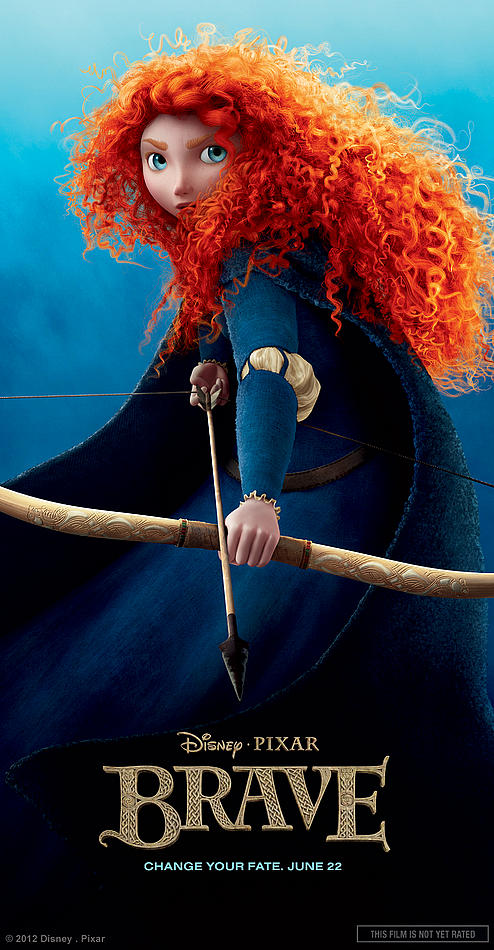 I was immensely stoked for Brave on a number of levels. First, Pixar kicks ass. With the exception of the underwhelming Cars and its pointless sequel, the quality of their work speaks for itself: Monsters, Inc is close to the finest animated movie of all time. Secondly, genuine action heroine films for the whole family are rare, to the point that they can probably be counted on the fingers of one hand over the past 25 years. Thirdly, it’s Scotland. Y’know, where I’m from. It’s the bit at the top of England. I feel I should mention this, because Pixar had originally tabbed Reese Witherspoon to voice the teenage, Scottish heroine, Merida. Fortunately, scheduling prevented this, and Pixar ended up with an all-Scottish lead cast.
I was immensely stoked for Brave on a number of levels. First, Pixar kicks ass. With the exception of the underwhelming Cars and its pointless sequel, the quality of their work speaks for itself: Monsters, Inc is close to the finest animated movie of all time. Secondly, genuine action heroine films for the whole family are rare, to the point that they can probably be counted on the fingers of one hand over the past 25 years. Thirdly, it’s Scotland. Y’know, where I’m from. It’s the bit at the top of England. I feel I should mention this, because Pixar had originally tabbed Reese Witherspoon to voice the teenage, Scottish heroine, Merida. Fortunately, scheduling prevented this, and Pixar ended up with an all-Scottish lead cast.
I also note the somewhat troubled production: despite two names getting directorial credit, this wasn’t a co-direction. Mark Andrews replacing Brenda Chapman as a result of what Chapman called “creative differences.” This was certainly an embarrassment to Pixar, who had long been criticized for their very male-dominated output, and had made a big fuss about Brave, not just featuring a female heroine, but also written and directed by a woman. The problem, according to Andrews, was that the story was unfocused. He said, “Whose story it was – whether it was Merida or her mom’s story or Merida choosing which parent she was going to be more like – these things weren’t working.” Chapman was unimpressed, telling the NY Times, “To have it taken away and given to someone else, and a man at that, was truly distressing on so many levels.”
Does this impact the final movie? It’s hard to see how it couldn’t, either through a compromise of the original vision, or as a result of the realization, mid-way through production, that it wasn’t working. Not that it’s alone – many Pixar movies have had bumpy journeys to the screen. But in this case, the end result was greeted with muted box-office success. It seems odd to describe a movie that grossed $235 million as a disappointment, but Brave showed a lot less “legs” than most Pixar films. Almost all have gathered total US box-office receipts four times or better than their opening “wide” weekend. Brave’s multiplier, of 3.56, is ahead of only the woeful Cars 2 (2.89) in studio history.
Not to say it’s bad, because it certainly isn’t. Pixar have an absolute and complete handle on the technical aspects: even in 2D, this is the best-animated (if not necessarily the “best animated”) film of 2012. The landscapes are lush to the point of seeming photographic, the characters are richly-detailed, down to the last red-haired ringlet on Merida’s head, and in motion, you remember why Pixar is #1. And there are plenty of moments where everything comes together. Witness the sequence below, depicting a contest between three suitors to win the hand of Merica. It is filled with 100% pure awesome, climaxing with the heroine’s declaration, “I am Merida, and I’ll be shooting for my own hand,” before she literally bursts out of the confines of princessly expectations.
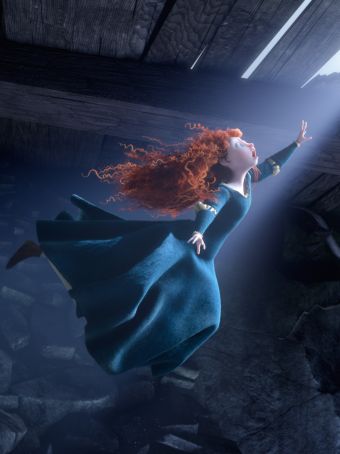 The problems are more with plotting – basically, the issue described above by Chapman is still present. The story starts in one direction, looking suitably action-oriented. It’s difficult to provide any specifics without giving spoilers – there’s a major plot-point not even hinted at in the trailers, which certainly surprised me. But I can see that it abruptly changes direction in the middle, going in a much less satisfactory direction, that seems almost to push Merida into the background of her own story. Even the climax relies less on any innate abilities of our heroine, such as her much-touted archery, or even her temperament, more the fortuitous toppling of a large geological entity [I doubt the film would have sold quite as well had it been named “Lucky”].
The problems are more with plotting – basically, the issue described above by Chapman is still present. The story starts in one direction, looking suitably action-oriented. It’s difficult to provide any specifics without giving spoilers – there’s a major plot-point not even hinted at in the trailers, which certainly surprised me. But I can see that it abruptly changes direction in the middle, going in a much less satisfactory direction, that seems almost to push Merida into the background of her own story. Even the climax relies less on any innate abilities of our heroine, such as her much-touted archery, or even her temperament, more the fortuitous toppling of a large geological entity [I doubt the film would have sold quite as well had it been named “Lucky”].
This conclusion is set up by the sort of happy compromise that is only deemed acceptable by both sides in fairy stories – anyone who has had a teenage daughter can vouch for this. I also have some qualms about the arranged marriage subplot that drives the first half of the film, which is depicted as little more than a “You’re going to do your homework, young lady, whether you like it or not” kind of way, which seems facile and dubious, even for a Disney-produced cartoon. And the introduction of “magic”, for the first time in a Pixar film, allows for the sort of convenient story developments that does nothing but weaken the overall structure. It’s not even a magical universe, instead, it’s more or less a one-shot deal, necessary to the plot.
It does fairly well in avoiding the Scottish clichés: one haggis joke, a random act of indecent exposure, and a soundtrack which oozes wannabe tartan are about it. The lack of any romantic love interest for the heroine is delightfully refreshing, and the lead actors all do a very, very good job in their roles, bringing their characters to life beautifully, to a degree that you can’t imagine any other voices coming out of their mouths. [I repeat: Reese Witherspoon?] It’s not boring. but fails to engross in the way that the better Pixar movies invariably succeed in doing. I got to the end entertained, but without any real sense of investment in Merida or her fate. Put bluntly: I just didn’t care about her, and the film succeeded mostly as a commercial for the Scottish Tourist Board. As a dramatic entity on its own merits, this falls somewhere between Brother Bear and Freaky Friday.
Dir: Mark Andrews + Brenda Chapman
Star (voice): Kelly Macdonald, Emma Thompson, Billy Connolly, Julie Walters





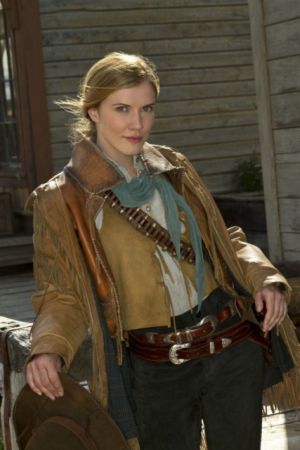 In 1866, the young child Hannah Beaumont (Canning, best known for her role in The Vampire Diaries) watches as the rest of her family is slaughtered by outlaw Frank McMurphy (Pyper-Ferguson). Twelve years later, Hannah is now getting her long-awaited revenge. Having been trained to shoot, ride and collect the bounty on wanted men by Isom Dart (Danny Glover in a small role), she is now reeling in the members of McMurphy’s gang, one by one. When McMurphy hears about this, he gathers up his entire posse and rides to Hannah’s base in Dodge City to finish off what he started, a decade before. Can Hannah – with the aid of the town’s deputy marshal, Wyatt Earp (Holt) and her other friends, come out on top?
In 1866, the young child Hannah Beaumont (Canning, best known for her role in The Vampire Diaries) watches as the rest of her family is slaughtered by outlaw Frank McMurphy (Pyper-Ferguson). Twelve years later, Hannah is now getting her long-awaited revenge. Having been trained to shoot, ride and collect the bounty on wanted men by Isom Dart (Danny Glover in a small role), she is now reeling in the members of McMurphy’s gang, one by one. When McMurphy hears about this, he gathers up his entire posse and rides to Hannah’s base in Dodge City to finish off what he started, a decade before. Can Hannah – with the aid of the town’s deputy marshal, Wyatt Earp (Holt) and her other friends, come out on top?
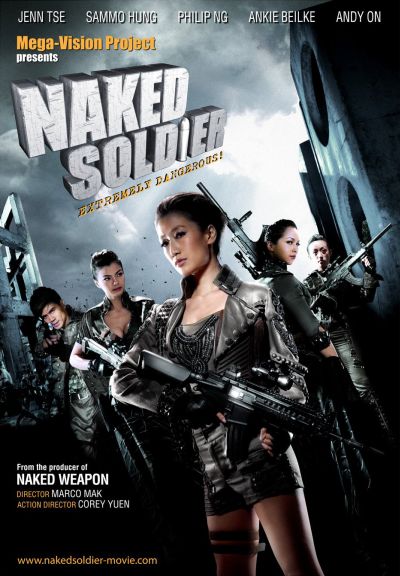 Ten years after Maggie Q got her career as an action heroine kickstarted with Weapon, and twenty after Killer rampaged its way into cult status, Jennifer Tse takes over – bearing more than a passing resemblance to her predecessor, I think. I think it’s kinda cool how the series gets revisited every decade, regular as clockwork: maybe famed producer Wong Jing has a house payment to make or something? Admittedly, there’s not much more than a tangential connection between the entries; three different directors, three different stars, and not much overlap in terms of plot. However, they still share a common approach, fetishising the female form and the act of assassination, with no shortage of style, and are the longest-running (in terms of years) GWG series around.
Ten years after Maggie Q got her career as an action heroine kickstarted with Weapon, and twenty after Killer rampaged its way into cult status, Jennifer Tse takes over – bearing more than a passing resemblance to her predecessor, I think. I think it’s kinda cool how the series gets revisited every decade, regular as clockwork: maybe famed producer Wong Jing has a house payment to make or something? Admittedly, there’s not much more than a tangential connection between the entries; three different directors, three different stars, and not much overlap in terms of plot. However, they still share a common approach, fetishising the female form and the act of assassination, with no shortage of style, and are the longest-running (in terms of years) GWG series around.
 Ok, it has become the biggest-grossing action heroine film
Ok, it has become the biggest-grossing action heroine film 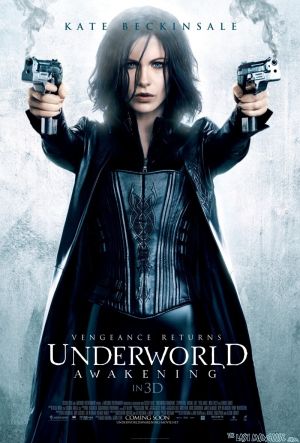 Actually, we quite enjoyed the third part, but we’re Bill Nighy marks. Still, nice to get back to the basics mentioned above, and the storyline here was a good one, even if more than a tad reminscent of Ultraviolet. After the revelation that vampires and lycans exist, humanity goes on a pogrom against the two species, driving them underground. Selene is capture, and wakes up to find herself, a dozen years later, in a wrecked research lab. Initially, she suspects Michael Corvin, but discovers a young girl, Eve (Eisley) to whom she has a connection; turns out to be another vampycan hybrid. Research company Antigen, under Dr. Jacob Lane (Rea) were using the two of them to make a vaccine, until Eve escaped, freeing Selene, and are now desperate to get their subjects back. But are their motives quite as altruistic as they appear?
Actually, we quite enjoyed the third part, but we’re Bill Nighy marks. Still, nice to get back to the basics mentioned above, and the storyline here was a good one, even if more than a tad reminscent of Ultraviolet. After the revelation that vampires and lycans exist, humanity goes on a pogrom against the two species, driving them underground. Selene is capture, and wakes up to find herself, a dozen years later, in a wrecked research lab. Initially, she suspects Michael Corvin, but discovers a young girl, Eve (Eisley) to whom she has a connection; turns out to be another vampycan hybrid. Research company Antigen, under Dr. Jacob Lane (Rea) were using the two of them to make a vaccine, until Eve escaped, freeing Selene, and are now desperate to get their subjects back. But are their motives quite as altruistic as they appear? A series of bank raids has local police baffled: ‘The Executives’ specialize in slick, swift in and outs, never over-reaching themselves. They’re also very well-dressed, which might actually be a clue, since these four robbers are women, under veteran criminal Fox (Evans). But all is not well in this gang of thieves, with some seeking a bigger score. Matters come to a head when they find a cop (Lombardi) nosing around their headquarters, and a tracking device attached to their van – all signs point to an informant within the gang, Is someone seeking to take over from Fox? Or is Fox herself tired of her accomplices? Let the accusations – and the bullets – fly.
A series of bank raids has local police baffled: ‘The Executives’ specialize in slick, swift in and outs, never over-reaching themselves. They’re also very well-dressed, which might actually be a clue, since these four robbers are women, under veteran criminal Fox (Evans). But all is not well in this gang of thieves, with some seeking a bigger score. Matters come to a head when they find a cop (Lombardi) nosing around their headquarters, and a tracking device attached to their van – all signs point to an informant within the gang, Is someone seeking to take over from Fox? Or is Fox herself tired of her accomplices? Let the accusations – and the bullets – fly.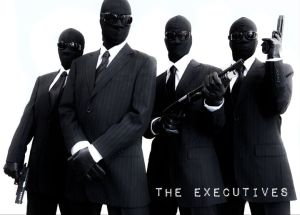 All told, however, these are small quibbles, and the bottom line is: we enjoyed it. Someone should give Blinky enough money for a proper movie – but I suspect, Notarile will likely keep on making films, whether anyone does or not! I’ll be looking out for them.
All told, however, these are small quibbles, and the bottom line is: we enjoyed it. Someone should give Blinky enough money for a proper movie – but I suspect, Notarile will likely keep on making films, whether anyone does or not! I’ll be looking out for them.